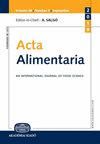Association between leisure screen time and adherence to the Mediterranean diet in a representative sample of Spanish children: A cross-sectional study
IF 0.8
4区 农林科学
Q4 FOOD SCIENCE & TECHNOLOGY
引用次数: 0
Abstract
The aim of this study was to assess the association between adherence to the Mediterranean diet and daily leisure screen time. We carried out a cross-sectional study using a representative sample of the Spanish population aged from 3 to 14 years recruited for the 2017 Spanish National Health Survey (n = 4,633). We derived the adherence to the Mediterranean diet according to a modified Mediterranean Diet Score and computed daily leisure screen time. We estimated crude and adjusted prevalence ratios, and 95% confidence intervals (95% CI) of high versus low, high versus medium and medium versus low adherence to the Mediterranean diet, according to categories of daily leisure screen time, using Poisson regression models. We found that the adjusted probabilities of having high adherence to the Mediterranean diet, versus low and medium adherence, were 23% (aPR 0.77; 95% CI 0.69, 0.86) and 14% (aPR 0.86; 95% CI 0.76, 0.97) lower, respectively, in children spending at least 180 minutes of daily leisure screen time in comparison with children spending less than one hour of daily screen time. This association was also observed when stratifying by age, except for children 12–14 years. In conclusion, high leisure screen time may be associated with lower adherence to the Mediterranean diet.具有代表性的西班牙儿童样本中休闲屏幕时间与地中海饮食坚持率之间的关系:横断面研究
本研究旨在评估地中海饮食习惯与日常休闲屏幕时间之间的关联。我们在 2017 年西班牙全国健康调查(n = 4,633 人)中对 3 至 14 岁的西班牙人口进行了代表性抽样,开展了一项横断面研究。我们根据修改后的地中海饮食评分得出了地中海饮食的坚持率,并计算了每日休闲屏幕时间。我们使用泊松回归模型,根据每日休闲屏幕时间的类别,估算了地中海饮食坚持率高对低、高对中、中对低的粗略和调整后流行率,以及 95% 置信区间 (95%CI)。我们发现,与每天休闲屏幕时间少于一小时的儿童相比,每天休闲屏幕时间至少 180 分钟的儿童坚持地中海饮食的高概率与坚持低概率和坚持中概率的调整概率分别低 23% (aPR 0.77; 95% CI 0.69, 0.86) 和 14% (aPR 0.86; 95% CI 0.76, 0.97)。在按年龄分层时,除 12-14 岁儿童外,也观察到了这种关联。总之,高休闲屏幕时间可能与较低的地中海饮食坚持率有关。
本文章由计算机程序翻译,如有差异,请以英文原文为准。
求助全文
约1分钟内获得全文
求助全文
来源期刊

Acta Alimentaria
农林科学-食品科技
CiteScore
1.80
自引率
0.00%
发文量
47
审稿时长
18-36 weeks
期刊介绍:
Acta Alimentaria publishes original papers and reviews on food science (physics, physical chemistry, chemistry, analysis, biology, microbiology, enzymology, engineering, instrumentation, automation and economics of foods, food production and food technology, food quality, post-harvest treatments, food safety and nutrition).
文献相关原料
| 公司名称 | 产品信息 | 采购帮参考价格 |
|---|
 求助内容:
求助内容: 应助结果提醒方式:
应助结果提醒方式:


